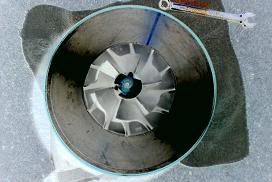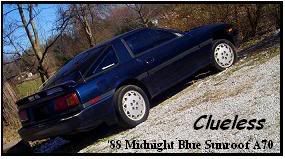words of wisdom not from me but its very true
I've been getting a lot of questions about if boosting decreases reliability. So I decided to type this up. Some of us may find this common knowledge, but hopefully the newbs will read this.
Reliability, can be decreased to an extent. It is not necessarily the turbo that is putting wear on the motor, rather it is the amount of power that you are gaining from that turbo. Power is generated by the extra heat and pressure built up in each cylinder. With more power, you of course get more heat and more pressure. So yes, to an extent, you are decreasing the reliability of the motor, but the same goes if you made more power with a naturally aspirated setup. The key answer to decreased reliability is generating more power than what the stock motor was intended for. Turbo is not the reason why you hear or see people blowing up their motors as soon as they turbocharge their motors. The reason they blow up their motors is because they either:
1. Get greedy and turn up the boost too high.
2. They don't keep up with the maintenance the way that any typical turbocharged car should be kept, whether it be turbocharged from the factory or not. (ie. religious oil changes, using Synthetic motor oil, keeping tabs on coolant levels and oil levels, putting in new spark plugs along with every 2nd or 3rd oil change, etc.)
3. Most importantly, they don't run a good engine management setup. Most guys are in such a hurry to turbocharge their car, they overlook the most important thing about keeping a turbocharged engine running correctly and reliably. (Consider this very crude analogy:
Consider a turbokit without engine management, kinda like having just met a beautiful girl to have sex with, but not having a condom Dangerous isn't it?)
That is pretty much the basics to it all. My bottom line is, whether you are naturally aspirated or turbocharged, reliability ultimately depends on the amount of power you are making, maintenancing, engine management, and the owner of the car. But with proper care, a high power car can last a very long time, maybe even longer than what you intend to keep the car or engine.
I've been getting a lot of questions about if boosting decreases reliability. So I decided to type this up. Some of us may find this common knowledge, but hopefully the newbs will read this.
Reliability, can be decreased to an extent. It is not necessarily the turbo that is putting wear on the motor, rather it is the amount of power that you are gaining from that turbo. Power is generated by the extra heat and pressure built up in each cylinder. With more power, you of course get more heat and more pressure. So yes, to an extent, you are decreasing the reliability of the motor, but the same goes if you made more power with a naturally aspirated setup. The key answer to decreased reliability is generating more power than what the stock motor was intended for. Turbo is not the reason why you hear or see people blowing up their motors as soon as they turbocharge their motors. The reason they blow up their motors is because they either:
1. Get greedy and turn up the boost too high.
2. They don't keep up with the maintenance the way that any typical turbocharged car should be kept, whether it be turbocharged from the factory or not. (ie. religious oil changes, using Synthetic motor oil, keeping tabs on coolant levels and oil levels, putting in new spark plugs along with every 2nd or 3rd oil change, etc.)
3. Most importantly, they don't run a good engine management setup. Most guys are in such a hurry to turbocharge their car, they overlook the most important thing about keeping a turbocharged engine running correctly and reliably. (Consider this very crude analogy:
Consider a turbokit without engine management, kinda like having just met a beautiful girl to have sex with, but not having a condom Dangerous isn't it?)
That is pretty much the basics to it all. My bottom line is, whether you are naturally aspirated or turbocharged, reliability ultimately depends on the amount of power you are making, maintenancing, engine management, and the owner of the car. But with proper care, a high power car can last a very long time, maybe even longer than what you intend to keep the car or engine.








Comment